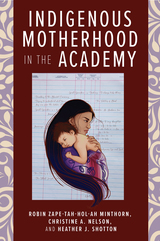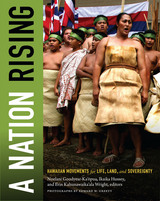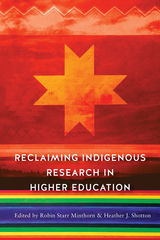3 books by Wright, Erin Kahunawai

Indigenous Motherhood in the Academy
Robin Zape-tah-hol-ah Minthorn
Rutgers University Press, 2022
Indigenous Motherhood in the Academy highlights the experiences and narratives emerging from Indigenous mothers in the academy who are negotiating their roles in multiple contexts. The essays in this volume contribute to the broader higher education literature and the literature on Indigenous representation in the academy, filling a longtime gap that has excluded Indigenous women scholar voices. This book covers diverse topics such as the journey to motherhood, lessons through motherhood, acknowledging ancestors and grandparents in one’s mothering, how historical trauma and violence plague the past, and balancing mothering through the healing process. More specific to Indigenous motherhood in the academy is how culture and place impacts mothering (specifically, if Indigenous mothers are not in their traditional homelands as they raise their children), how academia impacts mothering, how mothering impacts scholarship, and how to negotiate loss and other complexities between motherhood and one’s role in the academy.
[more]

A Nation Rising
Hawaiian Movements for Life, Land, and Sovereignty
Noelani Goodyear-Ka'opua, Ikaika Hussey, and Erin Kahunawaika'ala Wright, eds.
Duke University Press, 2014
A Nation Rising chronicles the political struggles and grassroots initiatives collectively known as the Hawaiian sovereignty movement. Scholars, community organizers, journalists, and filmmakers contribute essays that explore Native Hawaiian resistance and resurgence from the 1970s to the early 2010s. Photographs and vignettes about particular activists further bring Hawaiian social movements to life. The stories and analyses of efforts to protect land and natural resources, resist community dispossession, and advance claims for sovereignty and self-determination reveal the diverse objectives and strategies, as well as the inevitable tensions, of the broad-tent sovereignty movement. The collection explores the Hawaiian political ethic of ea, which both includes and exceeds dominant notions of state-based sovereignty. A Nation Rising raises issues that resonate far beyond the Hawaiian archipelago, issues such as Indigenous cultural revitalization, environmental justice, and demilitarization.
Contributors. Noa Emmett Aluli, Ibrahim G. Aoudé, Kekuni Blaisdell, Joan Conrow, Noelani Goodyear-Ka'opua, Edward W. Greevy, Ulla Hasager, Pauahi Ho'okano, Micky Huihui, Ikaika Hussey, Manu Ka‘iama, Le‘a Malia Kanehe, J. Kehaulani Kauanui, Anne Keala Kelly, Jacqueline Lasky, Davianna Pomaika'i McGregor, Nalani Minton, Kalamaoka'aina Niheu, Katrina-Ann R. Kapa'anaokalaokeola Nakoa Oliveira, Jonathan Kamakawiwo'ole Osorio, Leon No'eau Peralto, Kekailoa Perry, Puhipau, Noenoe K. Silva, D. Kapua‘ala Sproat, Ty P. Kawika Tengan, Mehana Blaich Vaughan, Kuhio Vogeler, Erin Kahunawaika’ala Wright
Contributors. Noa Emmett Aluli, Ibrahim G. Aoudé, Kekuni Blaisdell, Joan Conrow, Noelani Goodyear-Ka'opua, Edward W. Greevy, Ulla Hasager, Pauahi Ho'okano, Micky Huihui, Ikaika Hussey, Manu Ka‘iama, Le‘a Malia Kanehe, J. Kehaulani Kauanui, Anne Keala Kelly, Jacqueline Lasky, Davianna Pomaika'i McGregor, Nalani Minton, Kalamaoka'aina Niheu, Katrina-Ann R. Kapa'anaokalaokeola Nakoa Oliveira, Jonathan Kamakawiwo'ole Osorio, Leon No'eau Peralto, Kekailoa Perry, Puhipau, Noenoe K. Silva, D. Kapua‘ala Sproat, Ty P. Kawika Tengan, Mehana Blaich Vaughan, Kuhio Vogeler, Erin Kahunawaika’ala Wright
[more]

Reclaiming Indigenous Research in Higher Education
Minthorn, Robin Starr
Rutgers University Press, 2018
Indigenous students remain one of the least represented populations in higher education. They continue to account for only one percent of the total post-secondary student population, and this lack of representation is felt in multiple ways beyond enrollment. Less research money is spent studying Indigenous students, and their interests are often left out of projects that otherwise purport to address diversity in higher education.
Recently, Native scholars have started to reclaim research through the development of their own research methodologies and paradigms that are based in tribal knowledge systems and values, and that allow inherent Indigenous knowledge and lived experiences to strengthen the research. Reclaiming Indigenous Research in Higher Education highlights the current scholarship emerging from these scholars of higher education. From understanding how Native American students make their way through school, to tracking tribal college and university transfer students, this book allows Native scholars to take center stage, and shines the light squarely on those least represented among us.
Recently, Native scholars have started to reclaim research through the development of their own research methodologies and paradigms that are based in tribal knowledge systems and values, and that allow inherent Indigenous knowledge and lived experiences to strengthen the research. Reclaiming Indigenous Research in Higher Education highlights the current scholarship emerging from these scholars of higher education. From understanding how Native American students make their way through school, to tracking tribal college and university transfer students, this book allows Native scholars to take center stage, and shines the light squarely on those least represented among us.
[more]
READERS
Browse our collection.
PUBLISHERS
See BiblioVault's publisher services.
STUDENT SERVICES
Files for college accessibility offices.
UChicago Accessibility Resources
home | accessibility | search | about | contact us
BiblioVault ® 2001 - 2024
The University of Chicago Press









